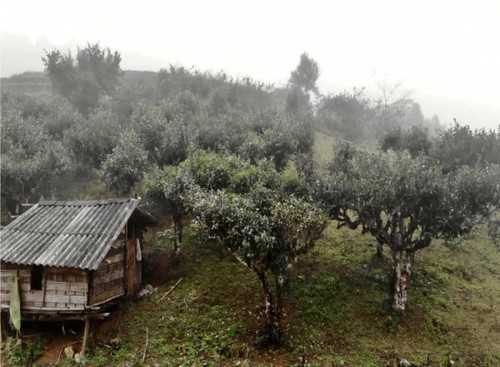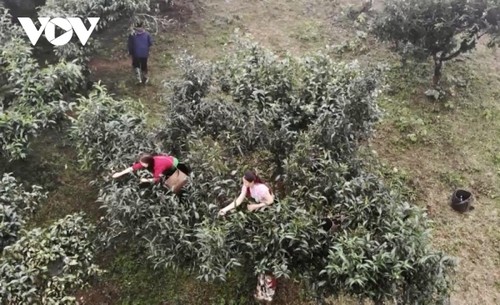 Ancient tea trees in Van Ho district, Son La province. Ancient tea trees in Van Ho district, Son La province. |
Shan Tuyet tea is a rare variety that is grown in the northern mountains of Vietnam.
The tree grows up to several meters high, and has large leaves and many buds covered by white hairs, giving it the name “snow tea”.
Shan Tuyet tea has a soft fragrance, brews to a honey-yellow color, and is very good for your health.
Each year, farmers harvest 3 tea crops - 4 if the weather is good. The first harvest, in the second or third lunar month, often turns out to be the best tea.
Only 105 of about 2,000 ancient tea trees in To Mua commune were deemed eligible for recognition as Vietnamese heritage trees, but the other trees have been included in a master plan of ancient trees in need of preservation.
Le Huy Cuong, head of the Technical Section of the Vietnam Heritage Tree Council, said, “This is the sixth tea growing area we’ve surveyed. All the ancient tea trees are beautiful and deserve to be honored as Vietnamese heritage trees. All places recognized as heritage tea complexes are valuable, attractive eco-tourism destinations.”
Ha Van Son of To Mua commune told VOV that his family inherited an ancient tea farm, adding, “My great-grandfather began growing tea trees about 200 years ago. My tea farm has about 100 trees which are cared for by the entire family.”
 The tea growing zone in To Mua promises to become an attractive tourist destination in Son La. The tea growing zone in To Mua promises to become an attractive tourist destination in Son La. |
Shan Tuyet tea in To Mua is grown on mountain sides at about 1,500 meters above sea level. The older a tea tree is, the better its leaves are for one’s health.
For a long time, To Mua villagers used manual methods to harvest, dry, and steep the tea, which was mainly consumed by the locals. Now To Mua has its own processing factory and has expanded production and trading.
“We want to introduce our processed tea to as many people as possible, because the tea is very good for one’s health. It can produce large profits for local growers,” said Bui Xuan Hong, Vice Chairman of the Hung Phat Tea Company.
The local people say they can turn their tea farms into eco-tourism destinations with the proper investment.
Thai Ba Sinh, Head of the Agriculture and Rural Development Section of Van Ho district, said, “Shan Tuyet tea is a specialty of Van Ho district. We’ll advise officials at higher levels to expand the model and protect the product to turn it into an OCOP item."
"A complex will be set up to enable visitors to enjoy this product of the centuries-old Shan Tuyet tea region.”